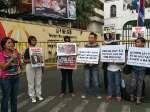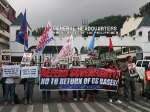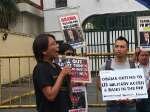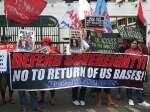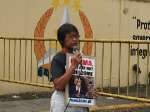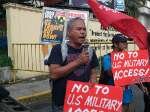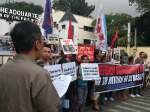New Release
October 26, 2011
November 1 will mark six years since the controversial “Subic rape” incident involving a Filipina and four visiting US Marines. The US is expected to say that no “rape” ever took place after the Court of Appeals reversed the earlier conviction of L/Cpl. Daniel Smith. The verdict of the CA was of course widely criticized by various sectors for disregarding the obvious facts of the case.
“What the Subic rape incident highlighted were the problems with the Visiting Forces Agreement, especially on custody issues. Up to now, these have not been resolved. The VFA continues to remind us of the special treatment accorded US troops,” said Bayan secretary general Renato M. Reyes, Jr.
“The US has always publicly insisted that under the VFA, even convicted US troops will remain in US custody pending appeal of their case. This interpretation however has been struck down by no less than the Philippine Supreme Court, yet the Philippine government since the regime of Gloria Macapagal Arroyo has not taken any action to address this outstanding problem,” Reyes said.
Bayan said that issues related to the VFA should be taken up by the Aquino government with visiting Assistant of Secretary of State for East Asia and Pacific Kurt Campbell who arrives today and leaves on October 27.
“Beyond the verdict of the courts, the issue that will continue to haunt us is the patent one-sidedness of the VFA when it comes to US soldiers who have violated Philippine laws,” Reyes said.
“More than a year in office, and for reasons unknown, Aquino still has not shown the results of its so-called VFA review, if ever there is one,” Reyes added.
Wikileaks on Subic rape
The whistleblower website Wikileaks provides information on how the US embassy and the Philippine government acted to insulate and preserve the VFA during the Subic rape trial.
In a cable dated October 2008, then US ambassador to the Philippines Kristie Kenney described the incident as having “serious consequences not only for LCpl Smith, but the most crucial elements of our diplomatic and military ties with the Philippines.”
When Makati RTC Judge Benjamin Pozon convicted Smith and ordered him brought to the Makati City Jail, the US embassy vigorously protested and put pressure on the Philippine government.
In a cable dated December 4, 2006, Kenney said that she and the Deputy Chief of Mission “protested vigorously to senior GRP officials over Smith’s detention in Philippine custody.”
The US protests seemed effective since Kenney also reported that “Philippine Cabinet officials are conferring with President Arroyo to seek a way out of the impasse over custody triggered by Judge Pozon’s order. The Secretary of Justice and the Department of Foreign Affairs have released statements supporting the view that Smith should be in U.S. custody during his appeal, according to VFA”.
Through the Romulo-Kenney Accord, Smith was transferred back to the US embassy. This triggered groups to ask the Supreme Court to declare the VFA unconstitutional. The SC later on upheld the constitutionality of the VFA but struck down the Romulo-Kenney accord as “not in accordance with the VFA” and ordered that Smith be returned to Philippine custody after DFA negotiations with the US embassy. But before this Smith could be transferred to back to Philippine custody, the Court of Appeals acquitted him of the rape charges.
US admits VFA provisions ambiguous
The Wikileaks cables clearly show that there were problems in the custody provisions of the VFA. In one embassy cable dated April 27, 2009 (09MANILA903), or after the acquittal of Smith, US ambassador Kristie Kenney admitted that custody provisions of the VFA were ambiguous and that clarifications had to be made. And for all its insistence of keeping custody of Smith, the US embassy admitted that it was not capable of serving as a detention facility.
“Given ambiguity in the VFA about both where custody lies following initial conviction of U.S. servicemen and detention facilities where they should be held, we believe it is important that we begin discussions on how we clarify these undesignated requirements and whether there is a more workable, less debilitating, custody process. The last three-and-a-half years have clearly demonstrated that U.S. Chancery grounds are not appropriate detention facilities to hold such servicemen in custody, not least because Mission personnel have neither the resources nor expertise to serve as jailors. We believe that the unusual situation of having a diplomatic facility as a place for detention should be clarified in future discussions with the Philippine government,” Kenney said in the confidential cable.
In the same cable, then Foreign Affairs Secretary Alberto Romulo told Kenney “that he was pleased with the outcome of the case, attributing the success on the excellent collaboration the Philippine government had enjoyed with the Embassy”.
Romulo said that “with several thousand U.S. servicemen currently in the Philippines for the Balikatan bilateral (military) exercises, it was imperative that both sides completely followed the letter of the VFA”.
In another cable dated September 18, 2009, Kenney again admitted the problems with the VFA but cautioned against renegotiation.
“Post would welcome a review by US Government lawyers to determine the best approach we can take to clarify the custody provisions. Following such a review, Mission would aim to establish this clarification through quiet discussions that would allow us to reach a common understanding with the Philippine government without the need to formally renegotiate the entire VFA,” Kenney said. ###

